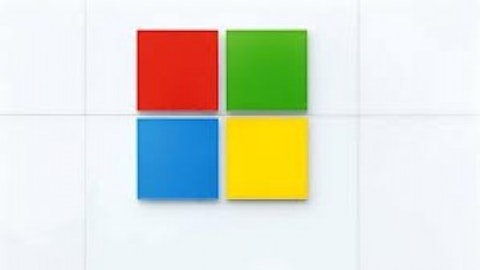Return on equity capital, or ROE, is one of the best metrics for evaluating how efficiently a company generates profits. ROE is equal to net income divided by shareholder’s equity. It tells you how skilled a management team is at deploying the capital it receives from issuing equities.
Some businesses naturally have an easier time producing a high ROE than others. Certain technology firms, whose chief asset is brainpower, are able to generate massive amounts of net income without the need for large investments from shareholders. Therefore, ROE comparisons work best between two companies with similar operations.
However, I thought it would be fun to look at all 30 of the companies in the DJIA and see which three had, on average over the past half-decade, the highest returns on equity capital. Two computer technology firms were in the top three, but neither took the top spot.
Coming in third
Is Microsoft Corporation (NASDAQ:MSFT) with a 5-year average ROE figure of 40. Although it should be noted that Microsoft had only the tenth highest ROE for the trailing twelve month period. Even so, bears should think long and hard before shorting this company.

Despite Apple Inc. (NASDAQ:AAPL)‘s attempts to paint it as a stodgy, uncool company, Microsoft Corporation (NASDAQ:MSFT) is still a money making machine. Net income has grown at a 10.7% annual rate over the past three years. Meanwhile, the company bought back nearly 6% of its own shares between 2009 and 2012.
I think Steve Ballmer gets way too much unnecessary criticism hurled at him. Much of the media, and the public, just want to see him fail. Looking his name up on Microsoft Corporation (NASDAQ:MSFT)’s own search engine brings up the related search “Steve Ballmer going crazy.” I get that he is nowhere near the software-guru that Bill Gates is, but does he really deserve that much hate? Windows phone hasn’t been a roaring success, the Skype acquisition was questionable, but its not like the company is performing badly.
In second place
Is another big name in technology, and a favorite of the world’s greatest investor.International Business Machines Corp. (NYSE:IBM) 5-year average return on equity of 70.96 is good for second best among Dow components. In the trailing twelve month period, IBM’s ROE of 83.28 was the best in the DJIA.
Taking a look at Berkshire’s latest form 13F-HR you’ll notice that Buffett added to his stake during the first quarter. Although not by much, only 6,500 shares. While I do not know the average price paid, the lowest price shares traded at during the first quarter was $187.68.
International Business Machines Corp. (NYSE:IBM) wants to be king of the information age. Whichever corporation can prove it is the best at assimilating, storing, and analyzing data to solve problems and increase efficiency will be rolling in the money, and genuinely making the world a better place. IBM knows this and is putting maximum effort into capitalizing on it.
International Business Machines Corp. (NYSE:IBM)’s software solutions have already accomplished amazing things. Municipalities are more able to effectively combat crime with IBM’s help. Collecting and analyzing data found in scientific papers, patents, and patient medical records has enabled the company to discover new uses for drugs that already exist, and improve the quality of patient care.
And the winner is…
Boeing’s (NYSE: BA) 5-year average return on equity of 104.38 is good for best in the Dow Jones Industrial Average. When I saw that number I was amazed, I had never seen a company with a return on equity of above 100 before. The company’s TTM ROE of 65.29 was second only to International Business Machines Corp. (NYSE:IBM).
The company’s stock got absolutely hammered on Friday after a Boeing 787 caught fire at a London airport. According to British news sources the fire was not caused by defective batteries, which led to the entire Dreamliner fleet being grounded in January.
Whenever Boeing’s stock gets knocked down like that, it might be time to start thinking of accumulating shares. While Boeing is trading fairly expensively relative to the company’s profits, it operates in an industry with high barriers to entry. A company with a reputation for building top-notch commercial airplanes, that the airlines deeply trust, is not a common thing.
Final foolish thoughts
Return on equity is an excellent tool for measuring how efficiently a company converts the money it receives from shareholders into profits. The best 5-year average return on equity figures in the DJIA belong to Boeing, International Business Machines Corp. (NYSE:IBM), and Microsoft Corporation (NASDAQ:MSFT). Those three companies are all fine examples of excellent businesses.
I would invest in all of them if the price was right. To me, Boeing seems too expensive right now relative to its ability to generate net income. Microsoft Corporation (NASDAQ:MSFT) has a rock solid balance sheet and has been buying back shares, but has made some questionable acquisitions in recent years.
My favorite company among these three is the one that had the best ROE in the TTM period. International Business Machines Corp. (NYSE:IBM) is utilizing data in ways that are improving this planet dramatically. Any company that can do that for a long period of time will likely produce some very happy, and wealthy, shareholders.
It’s incredible to think just how much of our digital and technological lives are almost entirely shaped and molded by just a handful of companies.
The article The Best Returns on Equity in the Dow Universe originally appeared on Fool.com.
Ryan Palmer has no position in any of the stocks mentioned. The Motley Fool owns shares of IBM. Ryan is a member of The Motley Fool Blog Network — entries represent the personal opinion of the blogger and are not formally edited.
Copyright © 1995 – 2013 The Motley Fool, LLC. All rights reserved. The Motley Fool has a disclosure policy.





